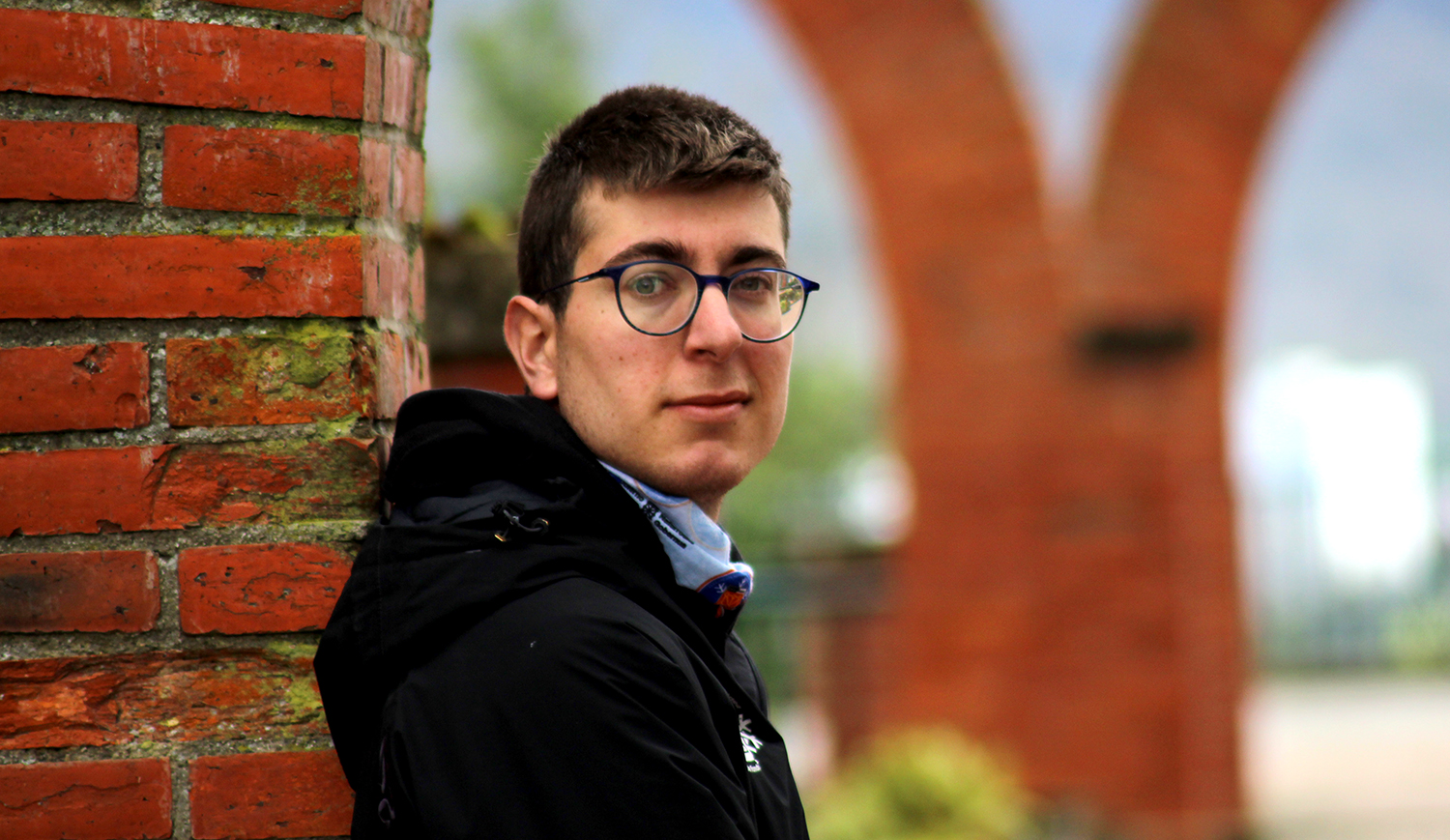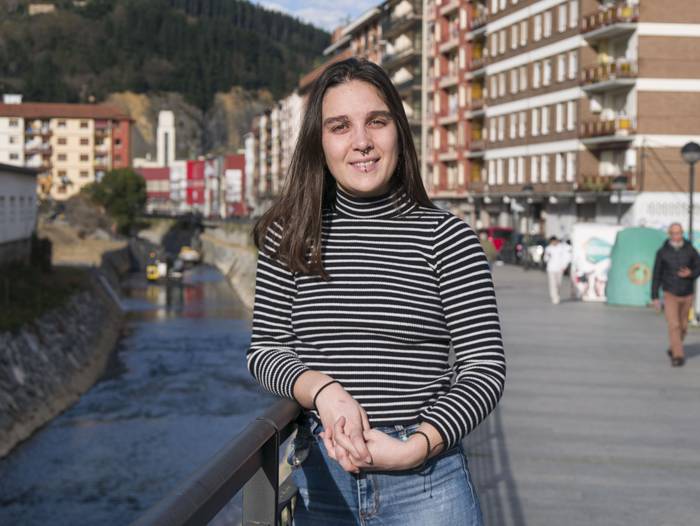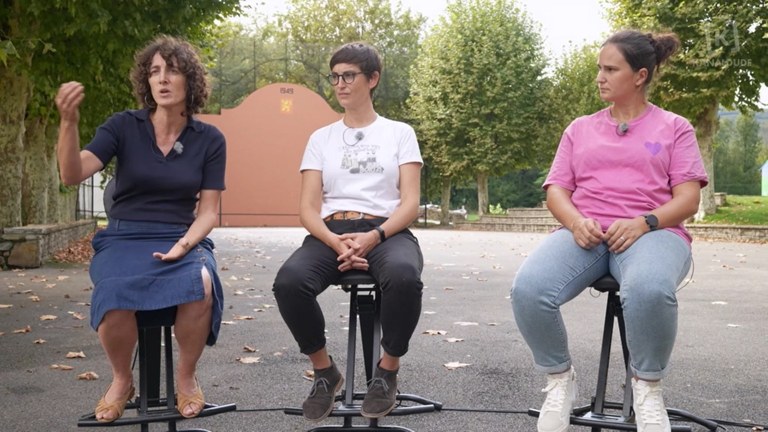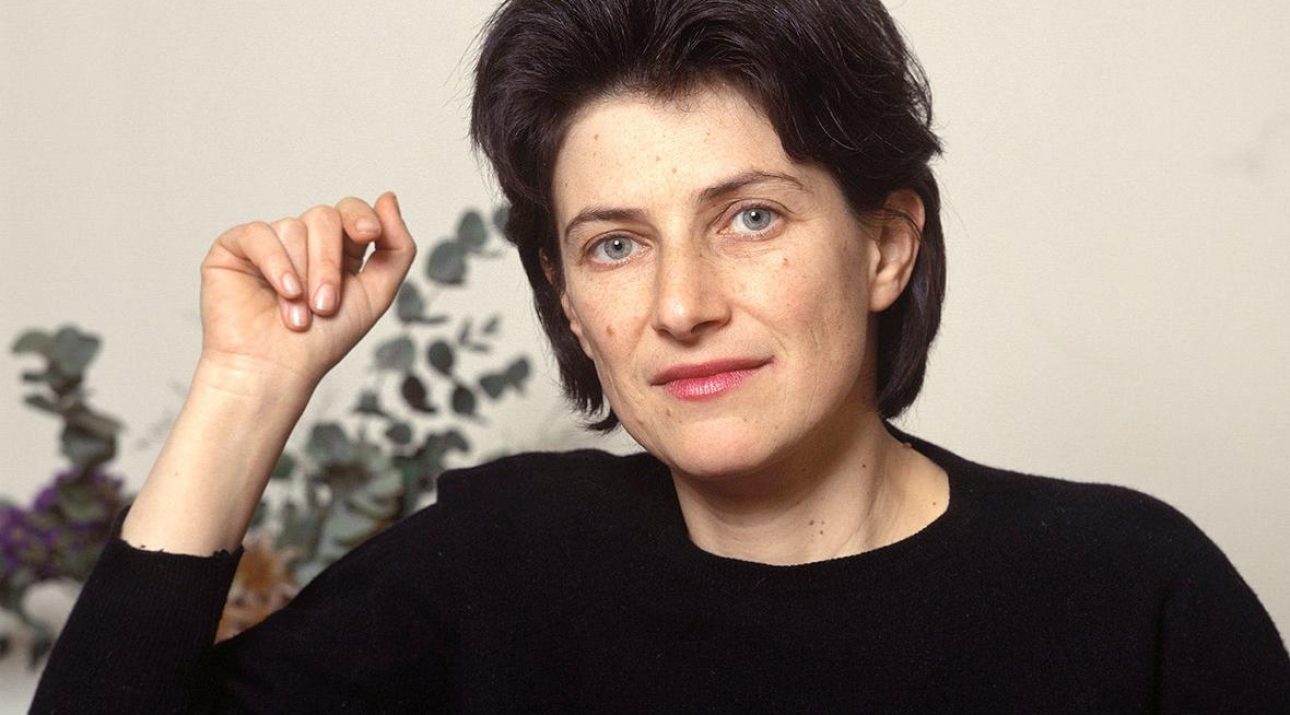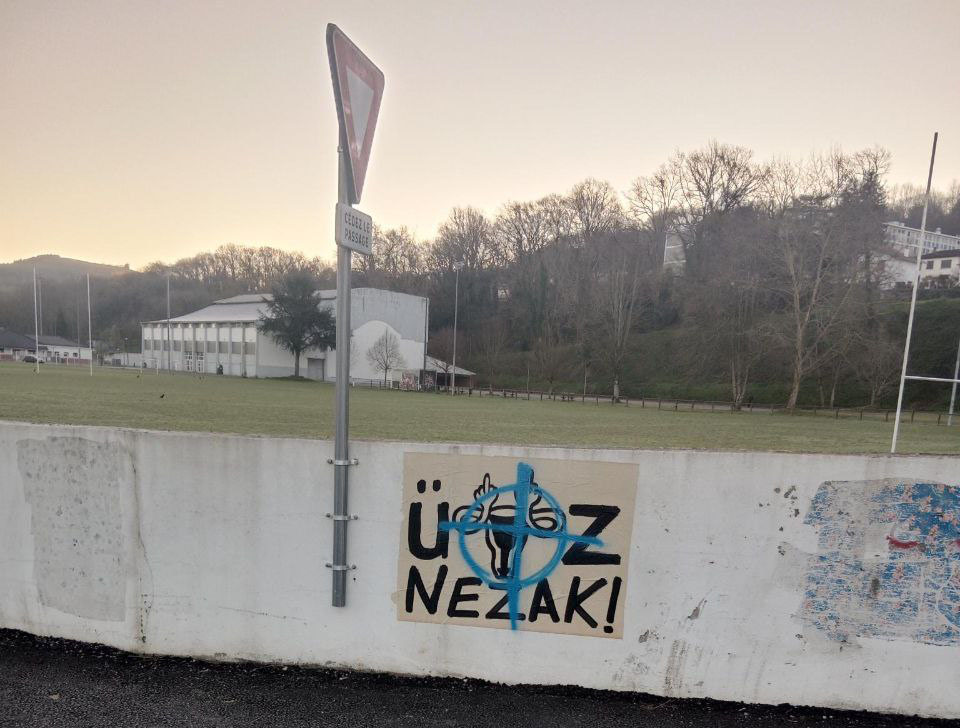Aitziber Bathtubs Ganuza "We have more and more assumed violence against women"
- Aitziber Bañuelos coordinates the projects of male violence and sexual violence against children. He is a member of the collective Eraikiz and has given us a deep dialogue with his critical and constructive vision.

What do you feel when you hear that male violence has killed another woman?
I live these facts in a very conscious and habitual way. Murder is the most dramatic expression of the violence that women are constantly suffering. When I hear them, I always come up with the same question. Why don't they put the means not to murder women?
What should those means be?
There is a lack of will, above all political will, understood in the broadest sense. That requires a change of 180 degrees, and I am not just referring to patriarchy, but also to the socio-economic system and capitalism. We should all look at how we structure ourselves and society. Today, in Europe, there are few women murdered here and now, compared to women who suffer violence that does not allow us to develop as people.
Violence has many faces.
We are born in a society that educates us about inequality, both in the binary genre and in other spheres. The same social structure generates violence so as not to meet the basic needs of the person.
Are we increasingly assuming violence against women?
Yes, we've normalized that architecture of power relations. In education and in the family we normalize what “has touched us”. We receive a lot of symbolic violence, women tell us that we need to meet people's needs and that we need to be kind and kind. They say that we have two main energies to offer society: reproduction and sex. This symbolic violence without realizing it builds identities based on inequality.
In the collective Eraikiz you are working on the transformation of this context. What exactly do they do?
Our name is significant. We want to build in a group, and for that we were born almost four years ago. We have two main bases. The first is that we work from love. People are the focus of our activity, not the economic benefit. The second is that we contribute to the professionals who work on the street in the social intervention. In 2015, we presented three projects in the institutions and accepted all three. The project “Feminism, machista violence and social intervention”, which will soon be four years old, has a great participation. In the last few days, 400 people working in social intervention participated. The people who work in this field often feel very alone.
Why this feeling of loneliness?
We women are construction workers. We live in a capitalist society designed for men, but at the same time we want to build other things on the other hand. That's scary. Most people around us want to “be” and “do” and not “be”. What matters is “where I sit” and “what I do”. Our fear of not being able to be and not being able to do so is enormous. We've been educated in fear, and in addition to stopping, we're watched with fear when we move, thinking that our movement is going to influence them.

You have created the 'Babes Uz' program to break with the silence that exists around sexual violence against children.
Yes, nine out of ten child assaults are hidden. Only 2% to 10% of such attacks are known. What about the remaining 90%? In most cases, the aggressor is family or in a nearby environment. It is time to remove the eye links and address the issue.
What kind of activities do you propose?
We are trying to make a direct intervention in the group that is asking us with our proposals. We create spaces for reflection, awareness, awareness and training. We take as a reference the world of adults, because it is we who can serve those who have suffered violence. We also need to work with the people who practise violence and put the spotlight on them so that they do not act that way again.
Are all the people who work as a group women?
No, in our sector we are majorities and that is evident in the group, but there are also men. They also have to get involved in the Machian violence, because they are the ones who cause this violence and they have a lot of work in this field. We also work in non-mixed spaces, because it's also necessary.
Who do you work for?
Especially for people who are invisible to society. We work with people, not with social problems. For us they are not users. Most of them are women with great difficulties, as well as children and adolescents. The latter are the least protected, and sexual violence against them hides. They don't want to expose the hypersexualization that exists today in the bodies of women and children. In addition, there is no free service for children suffering from ill-treatment.
You underline the critical and constructive view of your work.
That's our philosophy. With the project “Feminism, Machista Violence and Social Intervention”, we wanted to criticize the laws that today protect women from male violence. But also valuing the work of professionals who work with these violence, mostly women. Only 20 per cent of women assaulted report and institutions focus on them. The remaining 80% is being set aside.
And with women who don't report who's working?
Endless partnerships without resources. We want to make the work of all of them visible. In most cases, it is a job contaminated by feminism and with good results. Many of the women assaulted come to the place where they want to reach and not to the place where society wants to take them. A network between theoretical feminism, activist and social intervention is essential, and that is where we are.
We also offer feminist social training.
Yes, we help design social projects from feminism and the intersectional perspective. The other day, for example, we were called by members of a music group to analyze how the feminist perspective was inserted into their songs. We also work towards prevention and empowerment, in actions aimed at a population in a situation of ‘risk’.
Is participation in the Eraikiz collective open?
Yes, both at a personal and associative level, all the necessary information can be found on our website. With collaboration, we want to shake and activate our consciences.
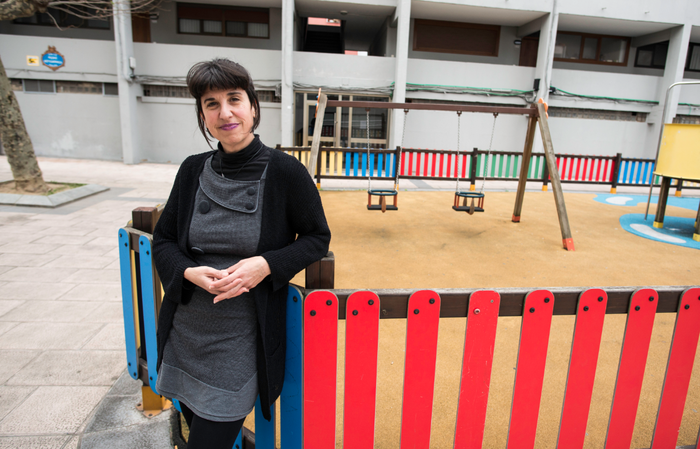
This interview was posted by Uriola and we brought it to ARGIA thanks to the CC-by-sa license.
In this link you can read what Bañuelos has explained to ARGIA about the violence suffered by children in the family.
Gozamen aparta bezain deskribatzeko zaila dakar, norbaiten hitzak irakurri edo entzun ostean, zera pentsatzeak: “Horixe zen neu aurreko hartan azaltzen saiatu nintzena!”. Idazlea eta itzultzailea da María Reimóndez, eta galegoz aritzen da, hizkuntza... [+]
Orain arte desgaituak ez diren pertsonekin lehiatu da Uharteko Ipar Eski Taldeko Eneko Leyun eskiatzailea (Iruñea, 1998). 2024-2025 denboraldian, lehenengo aldiz parte hartu du Adimen Urritasuna duten Pertsonentzako Iraupeneko Eskiko Espainiako Txapelketan. Urrezko... [+]
Joan den urte hondarrean atera da L'affaire Ange Soleil, le dépeceur d'Aubervilliers (Ange Soleil afera, Aubervilliers-ko puskatzailea) eleberria, Christelle Lozère-k idatzia. Lozère da artearen historiako irakasle bakarra Antilletako... [+]
Endometriosiaren Nazioarteko Eguna izan zen, martxoak 14a. AINTZANE CUADRA MARIGORTAri (Amurrio, 1995) gaixotasun hori diagnostikatu zioten urtarrilean, lehen sintomak duela lau urte nabaritzen hasi zen arren. Gaitz horri ikusgarritasuna ematearen beharraz mintzatu da.
Duela aste batzuk, gurean egon ziren El Salvadorko eta Kanarietako emakumeen eskubideen aldeko hainbat aktibista. Sexu- eta ugalketa-eskubideez eta eskubide horiek urratzeak emakumeengan dituen ondorioez aritu gara; hala nola El Salvadorren berezko abortuak izanda homizidio... [+]
Zuberoako ohiturei buruzko bi liburu ditut gogoan. Batek XX. mendean aritu izan diren 180 dantzari eta soinulari aipatzen ditu. Haien artean, emakumezkorik ez da agertzen. Besteak, pastoralei egiten die errepasoa eta hor emakumeak aipatu aipatzen dira, baina omisio esanguratsuak... [+]
1984an ‘Bizitza Nola Badoan’ lehen poema liburua (Maiatz) argitaratu zuenetik hainbat poema-liburu, narrazio eta eleberri argitaratu ditu Itxaro Borda idazleak. 2024an argitaratu zuen azken lana, ‘Itzalen tektonika’ (SUSA), eta egunero zutabea idazten du... [+]
Antifaxismoari buruz idatzi nahiko nuke, hori baita aurten mugimendu feministaren gaia. Alabaina, eskratxea egin diote Martxoaren 8ko bezperan euskal kazetari antifaxista eta profeminista bati.
Gizonak bere lehenengo liburua aurkeztu du Madrilen bi kazetari ospetsuk... [+]
Pertsona lodiek lodiak izateagatik bizi izan duten eta bizi duten indarkeriaren inguruan teorizatzeko espazio bat sortzea du helburu ‘Nadie hablará de nosotras’ podcastak. Cristina de Tena (Madril, 1990) eta Lara Gil (Fuenlabrada, Espainia, 1988) aktibista... [+]
Donostiako Tabakaleran, beste urte batez, hitza eta irudia elkar nahasi eta lotu dituzte Zinea eta literatura jardunaldietan. Aurten, Chantal Akerman zinegile belgikarraren obra izan dute aztergai; haren film bana hautatu eta aztertu dute Itxaro Bordak, Karmele Jaiok eta Danele... [+]
Martxoak 8an egindako pintaketak gainetik margotu dituzte ikur faxistekin Zuberoako hiriburuan. Horren aurrean elkarretaratzera deitu dute, astelehenean.












